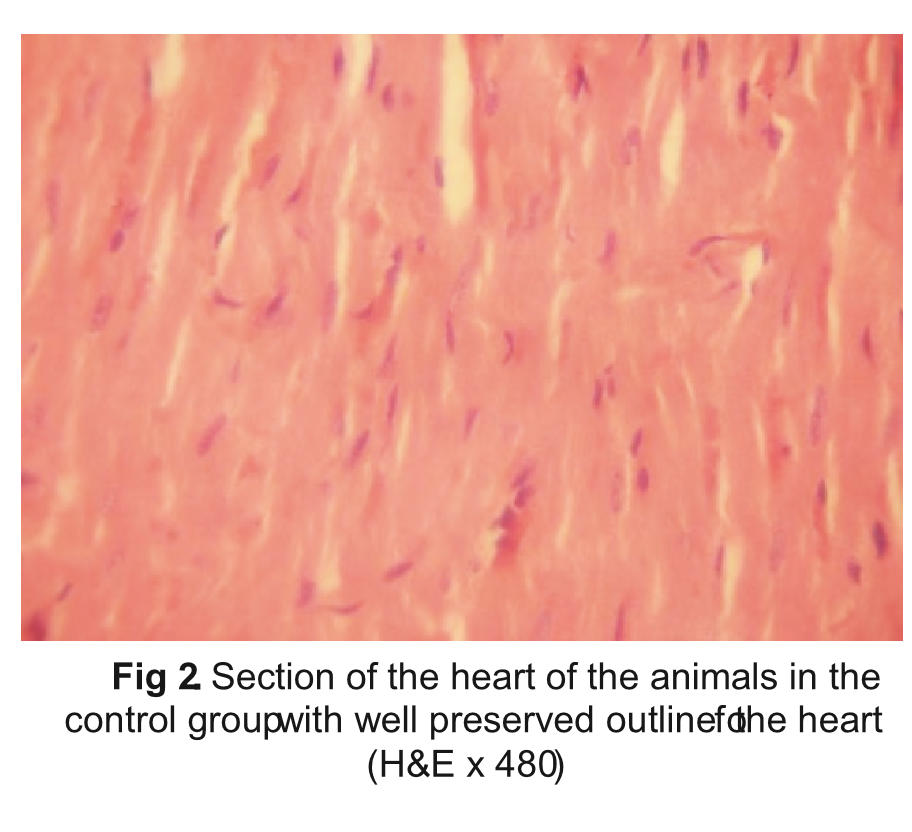Histological changes in the vital organs of male rats following short term exposure to smoke extract of Cannabis sativa.
Keywords:
Cannabis, vital organs, histological changesAbstract
Introduction: Beneficial effects of cannabis intake by any route of administration has since ages been trailed with controversial reports of scientific studies. This study was designed to evaluate the effects of short term exposure to smoke of Cannabis sativa on the vital organs (heart, lungs, liver, kidney and testes) of male rats.
Methods: Ten (10) male Sprague Dawley (SD) rats with average weight of 140 g were randomly divided into two (2) groups (A and B). Animals in group A (experimental group)were exposed to smoke from a completely burnt 0.74g leaves of Cannabis sativa, wrapped in 0.5g of sterilized cotton wool for 5 minutes three times daily (7am, 10am, and 1pm) while animals in group B (control group) were exposed to smoke from completely burnt 0.5g of sterilized cotton wool. All animals vg.had 5 day exposure to smoke of Cannabis and were sacrificed at least three hours after the last smoke exposure by cervical dislocation. In essence, all animals in the control and treatment groups were exposed to normal air in-between treatments. The rationale behind exposing animals in the control group to cotton wool smoke is to show that sterile cotton wool used as the vehicle for cannabis in the treatment group did not have any extra
cytological/histological effect. The vital organs were carefully excised, rinsed, blotted dry and were transferred into (bouin's fluid and 10% formol saline) for at least 72 hours before further histological protocol and analysis.
Discussion: different histological changes observed in these vital organs include mild edema and destruction of myocardial fibers, degeneration of the hepatocytes, slugging off of the germ cells, enlargement of the alveoli and distortion of the renal cortex.
Conclusion: We inferred that short term exposure to smoke of Cannabis sativa may be associated with damage to some vital organs in SD rats.
References
Hall, W., Johnston, L. & Donnelly, N. The epidemiology of cannabis use and its consequences. In: Kalant H, Corrigal W, Hall W, Smart R, Eds. The health effects of cannabis. Toronto: Addiction Research Foundation. 1998.
Hall, W., Solowij, N. & Lemon, J. The health and psychological consequences of cannabis use. National Drug Strategy Monograph Series no 25. Canberra:
Australian Government Publishing Service, 1994.
Farnsworth, N. R. Pharmacognosy and Chemistry of Cannabis sativa. J. Am.Pharm. Assoc 1969; 59: 410.
Ashton, C. H. Pharmacology and effects of cannabis: a brief review. Br. J. Psychiatry 2001; 178: 101–106.
Burns, T. L. & Ineck, J. R. Cannabinoid analgesia as a potential new therapeutic option in the treatment of chronic pain. The Annals of Pharmacotherapy 2006; 40 (2):251-60.
Downer, E. J. & Campbell, V. A. Phytocannabinoids, CNS Cells and Development: A Dead Issue? Drug and Alcohol Review 2010; 29(1):91-98.
Novak, J., Zitterl-Eglseer, K.; Deans, S. G. & Franz, C. M. Essential oils of different cultivars of Cannabis sativa L. and their antimicrobial activity. Flavor and Fragrance Journal 2001; 16 (4): 259–262.
Adekomi, D. A. Madagascar periwinkle (Catharanthus roseus) Enhances Kidney and Liver Functions in Wistar Rats. Int. J. Biomed.& Hlth. Sci. 2010; 6(4): 245-
National Institutes of Health Guide for the Care and Use of Laboratory Animals: DHEW Publication (NIH), revised. Office of Science and Health Reports, DRR/NIH, Bethesda, USA, 1985
Onarlioglu, B.; Onarlioglu, T. & Erdal, S. The Effect of Lead Inhalation on Rat Lung Morphology. Tr. J. Of Medical Sciences 1999; 29:617-622.
Wayne, H and Nadia S. Adverse Effects of Cannabis. Lancet 1998; 352: 1611–16.
Tijani A.A and Adekomi D.A.
Neurotoxic effects of aqueous leaf extract of Cannabis sativa on the visual cortex of adult wistar rats. Tropical Journal of Health Sciences 2011; 18 (2): 44-49,
Frances, R. A.; Betty, B. & Zuurmond, T.
J. Effects of the Oral Administration of Cannabis sativa (Dagga) on Chacma Baboons (Papio ursinus) S. Afr. med. J. 1979; 55:1127-1132.
Carlini, E. A., Karniol, I. G. Renault, P. F. & Schuster, C. R. Effects of Marihuana in Laboratory Animals and in Man. Br. J. Pharmac. 1974; 50:299-309,.
Manno, J. E., Kiplinger, G. F. & Scholz, N. The Influence of Alcohol and Marihuana on Motor and Mental
Performance. Clin. Pharmac. Ther. 1971; 12:202-211.
Stevens, A. and Lowe, J. Human Histology, 3rd Edn, Elsevier Mosby, 2005:232.
Junqueira, L. C. & Carneiro, J. Basic Histology, 10th Edn, Lange Edition, McGraw Hill 2003, pp. 340. ISBN 0-07121565-4.
Vaux, D. L., Haecker, G. & Strasser, A.
An Evolutionary Perspective on
Apoptosis. Cell 1994; 76: 777-781.
Bose, S. & Sinha, S. P. Modulation of Ochratoxin-produced Genotoxicity in Mice by Vitamin C. Food and Chemical Toxicology 1994; 32: 533-537.
Shen, H. M., Dai, J., Chia, S. E., Lim, A. & Ong, C. N. Detection of Apoptotic Alterations in Sperm in Subfertile Patients and their Correlations with Sperm Quality. Journal of Human
Reproduction 2002; 17: 1266- 73.
Grunewald, S., Paasch, U., Said, T. M.,
Sharma, R. K. Glander, H. J. & Agarwal,
A. Caspase activation in Human
Spermatozoa in Response to
Physiological and Pathological Stimuli. Fertility and Sterility 2005; 83 (1): 11062.
Schulte-Hermann, R., Bursch, W., Marian, B. & Grasl-Kraupp, B. Active Cell Death (Apoptosis) and Cellular Proliferation as Indicators of Exposure to
Carcinogens. IARC Scientific Publications (Lyon) 1999; 146: 273-285.
Pollman, M. J., Yamada, T., Horiuchi, M. & Gibbons, G. H. Vasoactive Substances Regulate Vascular Smooth Muscle Cell Apoptosis. Circulation Research 1996; 79: 748-756.

Downloads
Published
How to Cite
Issue
Section
License
Copyright (c) 2023 Research Journal of Health Sciences

This work is licensed under a Creative Commons Attribution-NonCommercial-NoDerivatives 4.0 International License.
Research Journal of Health Sciences journal is a peer reviewed, Open Access journal. The Journal subscribed to terms and conditions of Open Access publication. Articles are distributed under the terms of Creative Commons License (CC BY-NC-ND 4.0). (http://creativecommons.org/licences/by-nc-nd/4.0). All articles are made freely accessible for everyone to read, download, copy and distribute as long as appropriate credit is given and the new creations are licensed under the identical terms.

